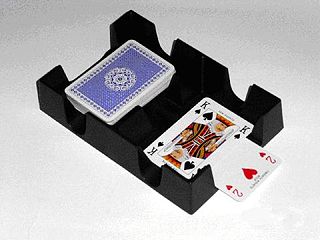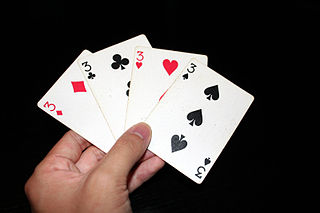
Canasta is a card game of the rummy family of games believed to be a variant of 500 Rum. Although many variations exist for two, three, five or six players, it is most commonly played by four in two partnerships with two standard decks of cards. Players attempt to make melds of seven cards of the same rank and "go out" by playing all cards in their hands. It is "the most recent card game to have achieved worldwide status as a classic".

Robbers' rummy is a card game for two or more players. It is a variant of German Rummy dating to the early 20th century. Being derived from normal rummy, it emphasises arrangement of cards based on card matching rules, while abandoning the notions of card discards and scoring entirely.

500 rum, also called pinochle rummy, Michigan rummy, Persian rummy, rummy 500 or 500 rummy, is a popular variant of rummy. The game of canasta and several other games are believed to have developed from this popular form of rummy. The distinctive feature of 500 rum is that each player scores the value of the sets or cards they meld. It may be played by 2 to 8 players, but it is best for 3 to 5.

Rummy is a group of games notable for similar gameplay based on matching cards of the same rank or sequence and same suit. The basic goal in any form of rummy is to build melds which can be either sets or runs and either be first to go out or to amass more points than the opposition.

Shanghai rum is a Rummy card game, based on gin rummy and a variation of Contract rummy played by 3 to 8 players. It is also known as California rummy.
Tonk, or tunk, is a matching card game, which combines features of knock rummy and conquian. Tonk is a relatively fast-paced game that can be played by 2-4 players. It can be played for just points or for money wagered.

Liverpool rummy is a multi-player, multi-round card game similar to other variants of rummy that adds features like buying and going out. It is played the same as Contract rummy, except that if a player manages to cut the exact number of cards required to deal the hand and leave a face-up card, then the cutting player's score is reduced by 50 points.

Conquian, Coon Can or Colonel is a rummy-style card game. David Parlett describes it as an ancestor to all modern rummy games, and a kind of proto-gin rummy. Before the appearance of gin rummy, it was described as "an excellent game for two players, quite different from any other in its principles and requiring very close attention and a good memory to play it well".

Contract rummy is a Rummy card game, based on gin rummy played by 3 to 8 players. It appeared in the United States during the Second World War. The game is also known as Combination rummy, Deuces Wild Rummy and Joker rummy, and a proprietary version of the game called Phase 10 was published in 1982.
Three thirteen is a variation of the card game Rummy. It is an eleven-round game played with two or more players. It requires two decks of cards with the jokers removed. Like other Rummy games, once the hands are dealt, the remainder of the cards are placed face down on the table. The top card from the deck is flipped face up and put beside the deck to start the discard pile.

Bing rummy is a variant of kalooki invented in the mining towns of Alaska. The game can be played with 2 to 8 players but works best with 3 to 6 players. It is unknown how the game came to be called “bing” although it may be because of the mining terms: unit of weight equal to 800 pounds, or a pile of rich lead ore. It is probably the second definition that gives the game its name referring to the pile of coins that accumulate throughout the game; especially as it is the Galena lead mines that popularized the term “bing ore”. These mines opened in 1919 about the time the game was developed.

Continental Rummy is a progressive partnership Rummy card game related to Rumino. It is considered the forerunner of the whole family of rummy games using two packs of cards as one. Its name derives from the fact that it is played throughout the continental Europe, the United States, Mexico, Canada, and also in South America. According to Albert Morehead, it was "at one time the most popular form of Rummy in women's afternoon games, until in 1950 it lost out to Canasta."
Zioncheck is a card game. It is similar to shanghai rummy, contract rummy, or phase 10. Hoyle's book of common card games describes several games as being based upon it, and Contract Rummy is believed to have originated from it.

Chinchón is a matching card game played in Spain, Uruguay, Argentina, Cape Verde and other places. It is a close variant of gin rummy, with which it shares the same objective: making sets, groups or runs, of matching cards.
Indian Cherokee Rummy is a card game in India with little variation from original rummy. It may be considered a cross between Rummy 500 and gin rummy. Indian Rummy is a variant of the rummy game popular in India that involves making valid sets out of 13 cards that are distributed among every player on the table. Each player is dealt 13 cards initially; if the number of players is 2, then a 52 cards deck is chosen for the game and if there are 6 players, two decks of 52 cards each is combined for the game. Each player has to draw and discard cards by turns till one player melds their cards with valid sets that meet the Rummy validation rules. It could be that Indian Rummy evolved from a version of Rummy in South Asia, Celebes Rummy, also called Rhuk.

Kalooki or Kaluki is a card game popularly played in Jamaica,. It is sometimes called Jamaican Rummy for similarities in structure the game bears with Contract Rummy or Gin Rummy. The games are, however, different and not to be confused.
Buraco is a Rummy-type card game in the Canasta family for four players in fixed partnerships in which the aim is to lay down combinations in groups of cards of equal rank and suit sequences, there being a bonus for combinations of seven cards or more. Buraco is a variation of Canasta which allows both standard melds as well as sequences. It originated from Uruguay and Argentina in the mid-1940s, with apparent characteristics of simplicity and implications that are often unforeseeable and absolutely involving. Its name derives from the Portuguese word "buraco" which means “hole”, applied to the minus score of any of the two partnerships. The game is also popular in the Arab world, specifically in the Persian Gulf; where it is known as 'Baraziliya' (Brazilian). Another popular variation of Buraco is Italian.

Penang rummy or si rummy is a variant of the rummy card game. The word si in Penang Hokkien language means 'dead'. It reflects the nature of the card game, where the hand is dead, with no drawing of new cards or exchanging of cards, throughout the whole game.

Marriage is a Rummy card game widely played in India. It uses three or more packs of playing cards.

German Rummy or Rommé is the most popular form of the worldwide game, Rummy, played in Austria and Germany. It is a game for 2 to 6 players and is played with two packs of French playing cards, each comprising 52 cards and 3 jokers. There are no partnerships. In Germany, the Germany Rummy Association is the umbrella organisation for local rummy clubs and organises national competitions. The game is often just known as Rommé in Germany and Rummy in Austria.









